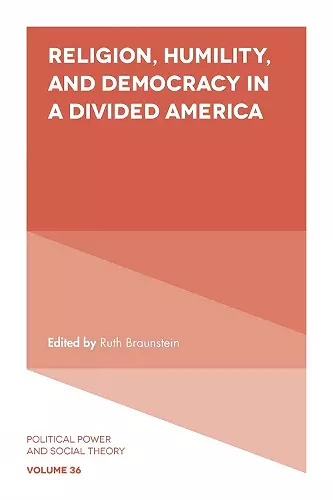Religion, Humility, and Democracy in a Divided America
Format:Hardback
Publisher:Emerald Publishing Limited
Published:5th Aug '19
Currently unavailable, and unfortunately no date known when it will be back

This volume asks how religious convictions inform citizens' engagement in American democratic life, particularly across deep political divides. Strong religious convictions motivate citizens across the political spectrum to engage in public life, yet are also viewed as a driver of political polarization by encouraging too much arrogance and not enough humility.
Featuring contributions from leading experts on religion and democratic life in the United States, this volume combines theoretical reflections on this tension with empirical investigations into how a range of religious actors balance conviction with humility in their public interactions with social and political others. Taken together, these contributions reveal that strong religious conviction can encourage political arrogance, but also humility; can lead to deepening political polarization that threatens democracy, but also commitment to movements for equality and justice that advance democracy; can encourage the building of walls, but also of bridges. Contributors also identify the factors and conditions driving each outcome, pointing to the roles of power, context, culture, institutions, and history in how different religious groups engage in political life.
The lessons this volume offers will be relevant to anyone interested in the complex relationship between religion and American democratic life; yet they also matter beyond religious groups. After all, religion is only one possible source of strong convictions that drive public engagement. As such, the volume also offers more general insight into how conviction shapes citizens' capacity and willingness to engage with others across deep divides.
Sociologists and philosophers from the US offer seven essays that explore how religious convictions impact how people engage in democratic life, especially across deep political divides. They discuss how a narrow vision of religious citizens as dogmatic believers has led to the framing of religion as a source of democratic distortion; how religion and democratic politics should relate to each other in a spirit of intellectual humility; how American evangelicals practice intellectual humility; evangelicals engaging in public discourse with Muslims and the qualities of intellectual humility involved; the basis of the intellectual humility in fostering relationships, in the context of the evangelical movement and acceptance of LGBTQI identities; how religion might promote intellectual humility in public life, drawing on case studies from faith-based community organizing in the US and liberation theology in Latin America; and an alternative theory of ontic webs as applied to public sociology. -- Copyright 2019 * Portland, OR *
ISBN: 9781789739503
Dimensions: 229mm x 152mm x 16mm
Weight: 398g
192 pages